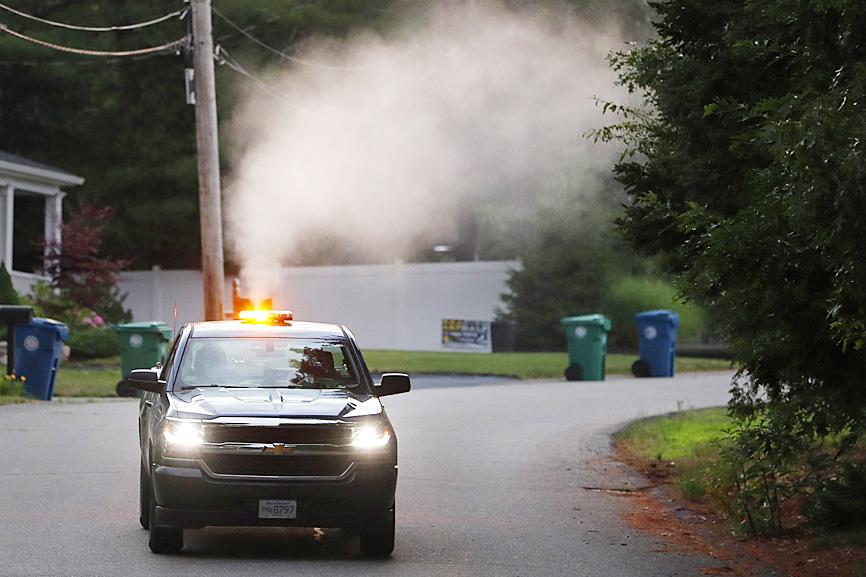Sophia Garabedian had been dealing with a persistent fever and painful headache when her parents found her unresponsive in her bed one morning last fall.
Doctors ultimately diagnosed the then-five-year-old Sudbury, Massachusetts, resident with eastern equine encephalitis (EEE), a rare, but severe mosquito-borne virus that causes brain swelling.
Garabedian survived the potentially fatal virus after about a month in Boston hospitals, but her parents say her ordeal and ongoing recovery should be a warning as people take advantage of the outdoors this summer.

Photo: AP
“It’s been a rough year,” her father, David Garabedian, said. “With any brain injury, it’s hard to tell. The damage is there. How she works through it is anyone’s guess.”
As the COVID-19 pandemic subsides for now in the hard-hit northeast US, public health officials in the region are warning about another potentially bad summer for EEE and other insect-borne illnesses.
EEE saw an unexpected resurgence last summer across 10 US states: Alabama, Connecticut, Georgia, Indiana, Massachusetts, Michigan, New Jersey, North Carolina, Rhode Island and Tennessee.
There were 38 human cases and 15 deaths from the virus, with many of the cases in Massachusetts and Michigan, the US Centers for Disease Control and Prevention.
Most years, the country sees just half a dozen cases of the virus in humans, it said.
In Massachusetts and New Jersey, officials have already detected EEE in mosquitoes this year, the earliest on record in those states.
“It’s unnerving,” said Scott Crans, who heads up mosquito control efforts for the New Jersey Department of Environmental Protection. “It could signal a busy year.”
Crans and other state health officials say EEE, which has no cure in humans, tends to come in two to three-year cycles, but they also stress that mosquito-borne diseases are notoriously tricky to predict.
Local health officials are also warning about the risk of contracting other insect-borne illnesses.
In Michigan, an invasive mosquito known to transmit dengue, Zika and other tropical viruses has already been detected for the first time this season, said Mary Grace Stobierski, the state’s public health veterinarian.
The state also had its first case of West Nile virus this season.
Ticks are also expected to be out earlier and in larger numbers this season because of the relatively mild winter, said Aaron Bernstein, a pediatrician at Boston Children’s Hospital and a director at Harvard’s School of Public Health.
That could mean more cases of debilitating Lyme disease and other tick-related illnesses, he said.
“Some of the people going into the woods more now might not be experienced with how to protect themselves in the forest, and that’s a concern,” he said.
The CDC has offered states additional help with mosquito testing this season as the pandemic has overwhelmed state public health offices, spokeswoman Candice Hoffmann said.
Officials in eight states and Washington have taken up the offer.
In Michigan, where six of that state’s 10 cases of EEE last year proved fatal, officials this summer have launched a pilot program to improve the state’s response to mosquito-borne illnesses.
Ned Walker, a medical entomologist at Michigan State University heading up the effort, said the goal is to create the kind of regular mosquito surveillance system already in place in Massachusetts and elsewhere to better predict and prepare for disease outbreaks.
In Massachusetts, , officials have been testing earlier, more often and in a wider range of locations this year in order to quickly identify infection clusters, State Epidemiologist Catherine Brown said.
A pilot effort is also testing the efficacy of different larvicides to help cull the mosquito population at its earliest stages, she said.
One troubling development: the two earliest cases of EEE in mosquitoes this year were found in a northern part of the state close to New Hampshire, rather than the virus’ typical hotspots near Cape Cod, where officials also detected the virus in a mosquito sample last week.
That, along with last year’s widespread cases, strongly suggests the territory of EEE-carrying mosquitoes is expanding, Brown said.
Climate changes that are causing warmer summers and altering bird migration patterns and local mosquito populations could be among the drivers, she said.
Meanwhile, an environmental group is calling on Massachusetts to avoid resorting to widespread aerial spraying of insecticide, which took place six times last year.
Maryland-based Public Employees for Environmental Responsibility filed a complaint with the Massachusetts Inspector General’s office this month, arguing that last year’s aerial spraying cost more than US$2 million but was not effective in reducing EEE-carrying mosquitoes.
“Last year was unprecedented,” she said. “No one wants to do that again.”

DISPUTED WATERS: The Philippines accused China of building an artificial island on Sabina Shoal, while Beijing said Manila was trying to mislead the global community The Philippine Coast Guard (PCG) is committed to sustaining a presence in a disputed area of the South China Sea to ensure Beijing does not carry out reclamation activities at Sabina Shoal (Xianbin Reef), its spokesperson said yesterday. The PCG on Saturday said it had deployed a ship to Sabina Shoal, where it accused China of building an artificial island, amid an escalating maritime row, adding two other vessels were in rotational deployment in the area. Since the ship’s deployment in the middle of last month, the PCG said it had discovered piles of dead and crushed coral that had been dumped

Experts have long warned about the threat posed by artificial intelligence (AI) going rogue, but a new research paper suggests it is already happening. AI systems, designed to be honest, have developed a troubling skill for deception, from tricking human players in online games of world conquest to hiring humans to solve “prove-you’re-not-a-robot” tests, a team of researchers said in the journal Patterns on Friday. While such examples might appear trivial, the underlying issues they expose could soon carry serious real-world consequences, said first author Peter Park, a postdoctoral fellow at the Massachusetts Institute of Technology specializing in AI existential safety. “These

The most powerful solar storm in more than two decades struck Earth on Friday, triggering spectacular celestial light shows from Tasmania to the UK — and threatening possible disruptions to satellites and power grids as it persists into the weekend. The first of several coronal mass ejections (CMEs) — expulsions of plasma and magnetic fields from the sun — came just after 4pm GMT, according to the US National Oceanic and Atmospheric Administration’s Space Weather Prediction Center. It was later upgraded to an “extreme” geomagnetic storm — the first since the “Halloween Storms” of October 2003 caused blackouts in Sweden and damaged

Using virtual-reality (VR) headsets, students at a Hong Kong university travel to a pavilion above the clouds to watch an artificial intelligence (AI)-generated Albert Einstein explain game theory. The students are part of a course at the Hong Kong University of Science and Technology (HKUST) that is testing the use of “AI lecturers” as the AI revolution hits campuses around the world. The mass availability of tools such as ChatGPT has sparked optimism about new leaps in productivity and teaching, but also fears over cheating, plagiarism and the replacement of human instructors. Pan Hui (許彬), a professor of computer science who is leading